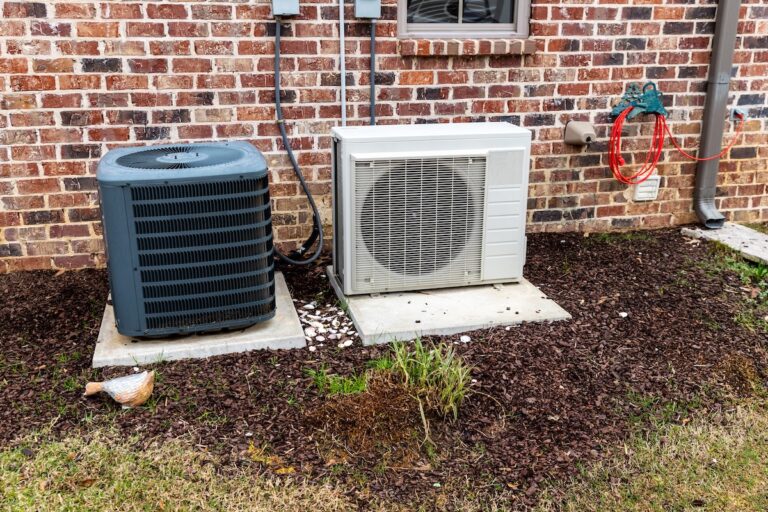
Keeping your home comfortable during hot summer months depends on having a reliable air conditioning system. However, knowing when to replace air conditioner units can save you from unexpected breakdowns and costly emergency repairs.
Your AC system works hard to maintain comfortable temperatures, but like any major appliance, it won’t last forever. Professional HVAC maintenance can extend your system’s life, but recognizing replacement signs early helps you plan and budget accordingly.
This comprehensive guide will help you identify the key warning signs that indicate it’s time for a new air conditioning system:
- Eight clear indicators your AC needs replacement
- Why timely replacement matters for your comfort and budget
- Cost considerations and energy efficiency benefits
- How to choose the right replacement system
🔍 Why Recognizing Replacement Signs Is Important

Understanding when your air conditioner needs replacement protects both your comfort and your wallet. Older systems become increasingly inefficient and unreliable, leading to several problems that impact your daily life.
Failed air conditioners during peak summer heat create uncomfortable living conditions. Emergency replacements often cost more due to limited availability and rushed installation schedules.
Key benefits of timely AC replacement include:
- Lower energy bills through improved efficiency ratings
- Reduced repair costs by avoiding frequent breakdowns
- Better indoor air quality with modern filtration systems
- Increased home value through updated HVAC equipment
- Enhanced comfort with consistent temperature control
- Environmental benefits from energy-efficient operation
🚨 8 Main Signs When It’s Time to Replace Your Air Conditioner

Recognizing these warning signs helps you make informed decisions about your cooling system. Each indicator suggests your current unit may be nearing the end of its useful life.
1. Your System Is 10-15 Years Old
Air conditioning systems typically last between 10-15 years with proper maintenance. Units approaching this age range often experience declining performance and increased repair needs.
- Older systems use outdated refrigerants that are being phased out
- Replacement parts become harder to find and more expensive
2. Rising Energy Bills Despite Normal Usage
Significant increases in your cooling costs often indicate declining system efficiency. Your AC works harder to achieve the same comfort levels, consuming more electricity.
- Compare current bills to previous years during similar weather conditions
- Energy efficiency ratings have improved dramatically in newer models
3. Frequent and Costly Repairs
When repair costs exceed 50% of a new system’s price, replacement becomes more economical. Multiple breakdowns within a short period suggest systemic problems.
- Keep records of all repair costs over the past two years
- Consider the inconvenience and discomfort of repeated service calls
4. Uneven Cooling Throughout Your Home
Inconsistent temperatures between rooms indicate your system can’t properly distribute cooled air. This problem often worsens as systems age and lose capacity.
- Some rooms feel significantly warmer than others
- Your system runs constantly but never reaches the desired temperature
5. Strange Noises or Unusual Odors
Grinding, squealing, or banging sounds from your AC unit signal mechanical problems. Musty or burning odors can indicate serious issues requiring immediate attention.
- Normal operation should be relatively quiet with minimal vibration
- Unusual smells may suggest electrical problems or mold growth
6. Poor Indoor Air Quality
Older air conditioners struggle to filter air effectively, allowing dust, pollen, and other contaminants to circulate throughout your home. This impacts both comfort and health.
- Family members experience increased allergy symptoms
- Visible dust accumulation despite regular cleaning
7. Excessive Humidity Levels
Your air conditioner should remove moisture from indoor air as it cools. Systems that can’t control humidity create uncomfortable, sticky conditions even at proper temperatures.
- Windows fog up frequently during humid weather
- Mold or mildew growth in previously unaffected areas
8. Uses R-22 Refrigerant (Freon)
The EPA banned production of R-22 refrigerant in 2020. Systems using this coolant face expensive repairs and limited service options as supplies dwindle.
- Check your system’s data plate or ask a technician about refrigerant type
- R-22 replacement costs have increased significantly due to scarcity
💰 Cost Considerations and Energy Efficiency Benefits

Modern air conditioning systems offer substantial improvements over older models. Understanding these advantages helps justify replacement costs and long-term savings potential.
Energy efficiency ratings have improved dramatically over the past decade. New systems use 20-40% less electricity than units from 2006 or earlier.
Financial Benefits of Replacement
- Lower Operating Costs: New systems with high SEER ratings significantly reduce monthly electricity bills. The average homeowner saves $200-400 annually on cooling costs.
- Fewer Repair Bills: Modern systems include better components and improved designs that reduce breakdown frequency. Manufacturer warranties provide additional protection against unexpected costs.
- Increased Home Value: Updated HVAC systems appeal to potential buyers and often recoup 60-80% of installation costs in resale value.
Environmental Impact Considerations
- Reduced Carbon Footprint: Energy-efficient systems consume less electricity, reducing environmental impact from power generation.
- Modern Refrigerants: New systems use environmentally friendly refrigerants that don’t contribute to ozone depletion.
- Smart Technology Integration: Many new systems include programmable thermostats and zoning capabilities that optimize energy usage based on occupancy patterns.
🎯 Take Action for Your Home’s Comfort
Recognizing when to replace your air conditioner ensures continued comfort while maximizing your investment. Don’t wait for complete system failure to make this important decision.
The signs outlined in this guide help you plan proactively rather than react to emergency situations. Early replacement allows you to research options, compare prices, and schedule installation at your convenience.
Modern air conditioning systems offer improved reliability, energy efficiency, and comfort control compared to older units. These benefits translate to lower operating costs and enhanced indoor air quality for your family.
Ready to upgrade your home’s cooling system? Contact Thelen Plumbing, Heating, and Air today for a free consultation. Our experienced technicians will assess your current system and recommend the best replacement options for your specific needs and budget.
Unlock Our Limited-Time Deals!
Take advantage of our offers on AC tune-ups, new installs, repairs, and more.
We Can’t Wait to Help Your Home!
"*" indicates required fields





